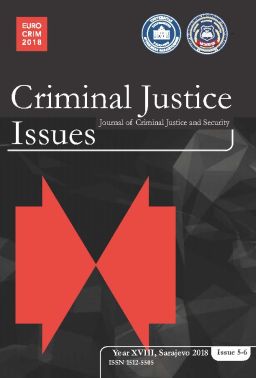GENOCIDE IN NORTHWESTERN BOSNIA AND HERZEGOVINA: A SOCIOLOGICAL AND PEDAGOGICAL ANALYSIS OF CRIMES AGAINST HUMANS AND AGAINST HUMANITY DURING AND AFTER THE WAR
GENOCIDE IN NORTHWESTERN BOSNIA AND HERZEGOVINA: A SOCIOLOGICAL AND PEDAGOGICAL ANALYSIS OF CRIMES AGAINST HUMANS AND AGAINST HUMANITY DURING AND AFTER THE WAR
Author(s): Goran Bašić, Zlatan DelićSubject(s): Military history, Criminology, Studies in violence and power, Nationalism Studies, Transformation Period (1990 - 2010), Sociology of Education, Politics and Identity, Peace and Conflict Studies
Published by: Fakultet za kriminalistiku, kriminologiju i sigurnosne studije Univerziteta u Sarajevu
Keywords: pedagogy; sociology; education; denial of genocide; war violence; interpersonal interaction; collective identity; narrative; peace potential; cosmopolitan education;
Summary/Abstract: The aim of this study is to reach a new understanding of genocide in northwestern Bosnia and Herzegovina during and after the Bosnian War (1992–1995). The analytical basis is a literature review of various studies from the domains of war sociology, social epistemology, and critical pedagogy. The analysis is based on the perspectives of the genocide in Bosnia as a process that began in northwestern and eastern Bosnia in 1992 and ended in Srebrenica in 1995 (in the Prijedor Municipality in northwestern Bosnia alone, more than 3000 civilians were killed in1992). Even after mass crimes directed against the very idea of humanity – and after genocide – it is necessary to work on a pedagogy of notions focused on the politics of reconciliation and the politics of emancipation of the oppressed and disenfranchised. Therefore, it is important for the culture of peace and the politics of reconciliation to spread and promote the considerable theoretical experiences of critical pedagogy in education. We need a peaceful orientational knowledge that provides the basis for new identity politics to evolve, politics that respect the right to be different and the right to bravely distance ourselves from criminal identity politics.
Journal: Kriminalističke teme – Časopis za kriminalistiku, kriminologiju i sigurnosne studije
- Issue Year: XVIII/2018
- Issue No: 5-6
- Page Range: 37-58
- Page Count: 22
- Language: English

